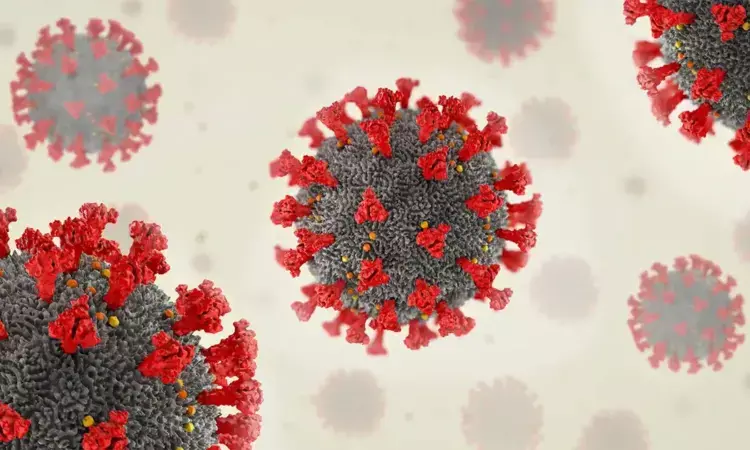- Home
- Medical news & Guidelines
- Anesthesiology
- Cardiology and CTVS
- Critical Care
- Dentistry
- Dermatology
- Diabetes and Endocrinology
- ENT
- Gastroenterology
- Medicine
- Nephrology
- Neurology
- Obstretics-Gynaecology
- Oncology
- Ophthalmology
- Orthopaedics
- Pediatrics-Neonatology
- Psychiatry
- Pulmonology
- Radiology
- Surgery
- Urology
- Laboratory Medicine
- Diet
- Nursing
- Paramedical
- Physiotherapy
- Health news
- Fact Check
- Bone Health Fact Check
- Brain Health Fact Check
- Cancer Related Fact Check
- Child Care Fact Check
- Dental and oral health fact check
- Diabetes and metabolic health fact check
- Diet and Nutrition Fact Check
- Eye and ENT Care Fact Check
- Fitness fact check
- Gut health fact check
- Heart health fact check
- Kidney health fact check
- Medical education fact check
- Men's health fact check
- Respiratory fact check
- Skin and hair care fact check
- Vaccine and Immunization fact check
- Women's health fact check
- AYUSH
- State News
- Andaman and Nicobar Islands
- Andhra Pradesh
- Arunachal Pradesh
- Assam
- Bihar
- Chandigarh
- Chattisgarh
- Dadra and Nagar Haveli
- Daman and Diu
- Delhi
- Goa
- Gujarat
- Haryana
- Himachal Pradesh
- Jammu & Kashmir
- Jharkhand
- Karnataka
- Kerala
- Ladakh
- Lakshadweep
- Madhya Pradesh
- Maharashtra
- Manipur
- Meghalaya
- Mizoram
- Nagaland
- Odisha
- Puducherry
- Punjab
- Rajasthan
- Sikkim
- Tamil Nadu
- Telangana
- Tripura
- Uttar Pradesh
- Uttrakhand
- West Bengal
- Medical Education
- Industry
People with COVID-19 infection more likely to develop Guillain-Barre syndrome within six weeks

COVID-19 Case at SMCH Raises Concerns
Israel: People with a recent COVID infection were six times more likely to develop Guillain-Barre than those without a recent infection, claims a recent study published in the October 18, 2023, online issue of Neurology. Also, people who received the mRNA vaccine from Pfizer-BioNTech were less likely to develop the disorder in the next six weeks than people who did not receive the mRNA vaccine.
“These findings further highlight the benefits of ongoing vaccination programs with mRNA-based vaccines,” said study author Anat Arbel, MD, of Lady Davis Carmel Medical Center in Haifa, Israel. “The results have important clinical and public health implications.”
Guillain-Barré syndrome is a rare autoimmune disorder in which the immune system attacks nerve cells. Symptoms start with weakness in the hands and feet and may progress to paralysis. Although it can be life-threatening, most people recover with few remaining problems. An exact cause of Guillain-Barré syndrome is unknown but it can occur after gastrointestinal or respiratory infections. Researchers note it occurs in up to 20 out of every one million people per year, and only in extremely rare cases does it follow certain vaccinations.
The study involved over 3 million people in Israel with no previous diagnosis of Guillain-Barré. They were followed from January 1, 2021, until June 30, 2022. During that time, 76 people developed Guillain-Barré. Each person with Guillain-Barré was matched to 10 people who did not have the syndrome, or 760 people.
Then researchers looked to see whether participants had a COVID infection or a COVID vaccine during the six weeks prior to the diagnosis of Guillain-Barré or the same time period for their matched participants.
Researchers determined that people with a recent COVID infection were six times more likely to develop Guillain-Barré than those without a recent infection. A total of 12% of the people with Guillain-Barré had a recent COVID infection, compared to 2% of the people who did not have Guillain-Barré.
In addition, 11% of those with Guillain-Barré had a recent vaccination with a mRNA vaccine, compared to 18% of those who did not have Guillain-Barré.
They also found that people with a recent mRNA vaccination were more than 50% less likely to develop Guillain-Barré than those without a recent mRNA vaccination.
“While Guillain-Barré is extremely rare, people should be aware that having a COVID infection can increase their risk of developing the disorder and receiving an mRNA vaccine can decrease their risk,” Arbel said.
A limitation of the study was that since not all participants had tests for COVID, it is possible that some people may have been classified with no evidence of COVID infection when they had an infection with no or mild symptoms.
The study does not prove that COVID infection increases the risk of Guillain-Barré or that mRNA vaccination decreases the risk. It only shows an association.
Dr Kamal Kant Kohli-MBBS, DTCD- a chest specialist with more than 30 years of practice and a flair for writing clinical articles, Dr Kamal Kant Kohli joined Medical Dialogues as a Chief Editor of Medical News. Besides writing articles, as an editor, he proofreads and verifies all the medical content published on Medical Dialogues including those coming from journals, studies,medical conferences,guidelines etc. Email: drkohli@medicaldialogues.in. Contact no. 011-43720751


